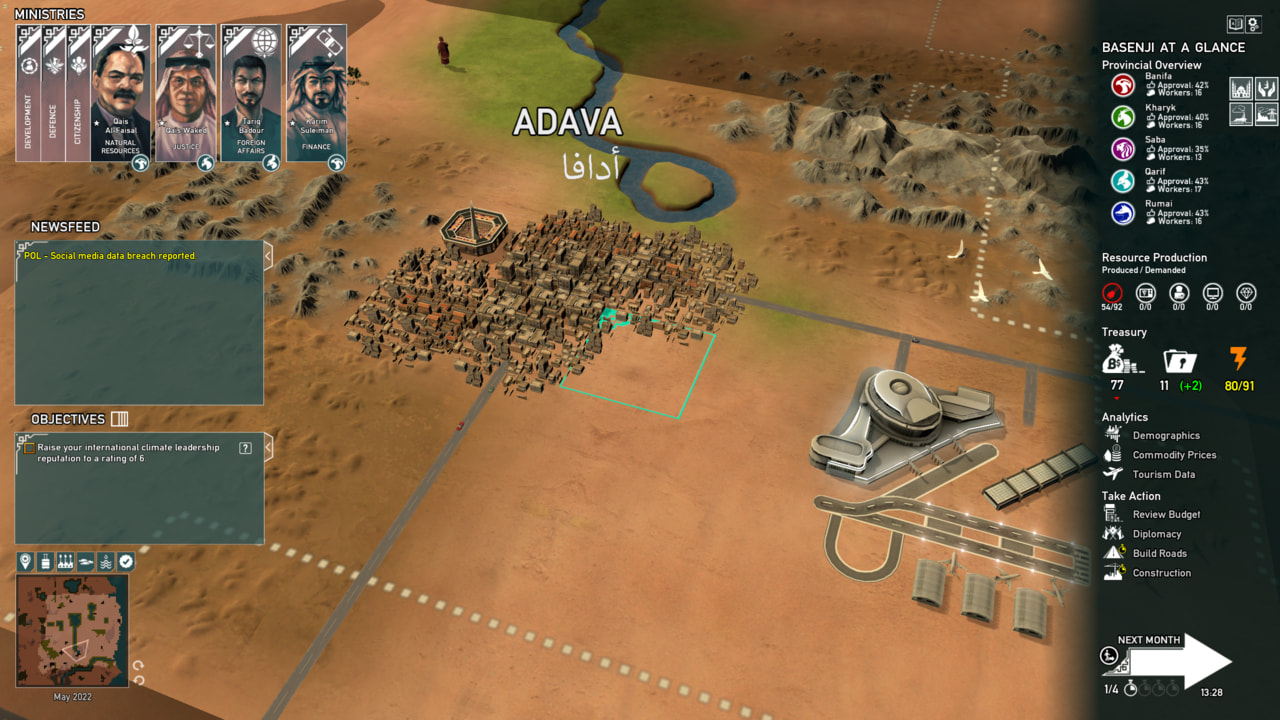Welcome to the first developer interview following the introduction of the new Showcase page! This week, we’ve interviewed Little Red Dog Games’ lead developer Ryan Hewer about their latest project, Rogue State Revolution.
Introduce your studio in a few sentences.
We’re Little Red Dog Games! We’re a commercial developer that has been developing deep strategy games with despotic roosters and snarky surveyor probes for almost a decade now.
We’d love to show off Rogue State Revolution, which will be debuting for Windows and Linux in late February 2021. As President of the People’s Republic of Basenji, you must appoint ministers and make sure they stay loyal. Build roads, factories, nuclear power plants and more, if you can afford it. Anything can happen: meteor strike, a pandemic, a cane-toad infestation, a robot apocalypse… if you can imagine it, there’s a good chance that it’s hiding somewhere in this game, waiting to be discovered. Your role is to care for your society, but a growing rebellion threatens to remove you from power. The game has lots of FMV, beautiful 3D visuals and represents a huge creative effort over the past two years. You can check it out on Steam.
How did you discover Godot? When did you start using it? Do you have prior experience with other game engines?
We’ve worked with other engines and frameworks before, but we stumbled upon Godot while actively looking for new game engines to try out with strong Linux support in 2015. We started with version 2-point-something and have delighted to see the engine grow and mature at the same pace as our own ambitions.
We published two games with Godot already, Deep Sixed in 2018 and Precipice in 2019.
Why did you choose Godot for your project?
Well, we’ve been using Godot for years and have grown very familiar with every little nook and cranny of the engine. Whenever the topic of switching comes up, we look around and it’s clear that this free, open-source, incredibly versatile engine meets all our needs and we can’t think of a good reason why we would need to. The node and scene architecture lets us design our games based on what we think makes sense for development, rather than forcing us into how an engine would want us to structure things.
Which parts of the game development process did you enjoy the most while working on your project?
I think most of us agree that the most fun is in the early stages when you’re fleshing out the design basis, building the foundations and implementing the basic structure of the game code. This is the time that every little addition feels like a big step and the progress is measured in miles rather than inches. It’s easy to see why people love to write tutorials and conceptual-proofs, it’s so rewarding!
Which parts of the game development process did you find the most difficult to apply in your project?
We’ve struggled a little with harmonizing the asset importation pipelines between Blender, Maya and other 3D tools software, and developing games with very large object counts has made optimizing for speed quite a challenge (though admittedly, that would also be a challenge regardless of what engine we were developing in).
How has Godot helped you advance on your project? Which aspects of Godot do you consider to be its strength?
We love how Godot’s scene structure emphasizes getting things done quickly and flexibly. Writing editor plugins and custom nodes is very useful, and if there is ever something that we want to tackle that it’s in the main branch, there is nothing stopping us from cracking the thing open and building our own solutions to whatever problems we might encounter.
How do you find Godot’s multi-platform support, both for the editor and your final project?
The platforms that Godot supports by default all work very well, especially the desktop platforms, where it shines. We’ve got a console partnership that we’ll be excited to reveal soon that has gone very smoothly. We have very little experience with mobile or HTML5 development.
Which challenges have you encountered when using Godot?
Importing 3D assets and animations can sometimes be a pain. Even though the compatibility with various formats has improved lately, we’re still running into issues with UV maps or shape keys from time to time, which are typically resolved by trying different file formats until one of them does the job in the matter intended. We have also encountered difficult-to-trace crashes in our exports that are exceedingly difficult to debug because they are not captured in the release build.
Which features would you like to see in future versions of Godot?
There’s a short-list of GDScript optimizations we’re looking forward to and improvements to the asset importation pipeline is welcome. Can we bring back particle attractors? Oh, and the themes system could use a bit of a restructuring. Like everybody else, we’re extremely excited about what is coming with Godot 4.0 and the road is now paved for us to pursue some really beautiful 3D products in the future.
Would you use Godot for a future project?
You can count on it and we have already broken ground on the next big thing in Godot. In our opinion, there are no perfect engines, just preferred tools for certain kinds of jobs. For us, Godot has always been our preferred tool for the kinds of games we like to develop.
Rogue State Revolution can be wishlisted on Steam and will be available on Windows and Linux.
